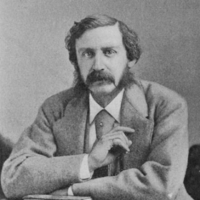Cadet Grey – Canto I
I
Act first, scene first. A study. Of a kind
Half cell, half salon, opulent yet grave;
Rare books, low-shelved, yet far above the mind
Of common man to compass or to crave;
Some slight relief of pamphlets that inclined
The soul at first to trifling, till, dismayed
By text and title, it drew back resigned,
Nor cared with levity to vex a shade
That to itself such perfect concord made.
II
Some thoughts like these perplexed the patriot brain
Of Jones, Lawgiver to the Commonwealth,
As on the threshold of this chaste domain
He paused expectant, and looked up in stealth
To darkened canvases that frowned amain,
With stern-eyed Puritans, who first began
To spread their roots in Georgius Primus’ reign,
Nor dropped till now, obedient to some plan,
Their century fruit,—the perfect Boston man.
III
Somewhere within that Russia-scented gloom
A voice catarrhal thrilled the Member’s ear:
‘Brief is our business, Jones. Look round this room!
Regard yon portraits! Read their meaning clear!
These much proclaim MY station. I presume
YOU are our Congressman, before whose wit
And sober judgment shall the youth appear
Who for West Point is deemed most just and fit
To serve his country and to honor it.
IV
’Such is my son! Elsewhere perhaps ’twere wise
Trial competitive should guide your choice.
There are some people I can well surmise
Themselves must show their merits. History’s voice
Spares me that trouble: all desert that lies
In yonder ancestor of Queen Anne’s day,
Or yon grave Governor, is all my boy’s,—
Reverts to him; entailed, as one might say;
In brief, result in Winthrop Adams Grey!’
V
He turned and laid his well-bred hand, and smiled,
On the cropped head of one who stood beside.
Ah me! in sooth it was no ruddy child
Nor brawny youth that thrilled the father’s pride;
’Twas but a Mind that somehow had beguiled
From soulless Matter processes that served
For speech and motion and digestion mild,
Content if all one moral purpose nerved,
Nor recked thereby its spine were somewhat curved.
VI
He was scarce eighteen. Yet ere he was eight
He had despoiled the classics; much he knew
Of Sanskrit; not that he placed undue weight
On this, but that it helped him with Hebrew,
His favorite tongue. He learned, alas! too late,
One can’t begin too early,—would regret
That boyish whim to ascertain the state
Of Venus’ atmosphere made him forget
That philologic goal on which his soul was set.
VII
He too had traveled; at the age of ten
Found Paris empty, dull except for art
And accent. 'Mabille’ with its glories then
Less than Egyptian 'Almees’ touched a heart
Nothing if not pure classic. If some men
Thought him a prig, it vexed not his conceit,
But moved his pity, and ofttimes his pen,
The better to instruct them, through some sheet
Published in Boston, and signed ‘Beacon Street.’
VIII
From premises so plain the blind could see
But one deduction, and it came next day.
‘In times like these, the very name of G.
Speaks volumes,’ wrote the Honorable J.
‘Inclosed please find appointment.’ Presently
Came a reception to which Harvard lent
Fourteen professors, and, to give esprit,
The Liberal Club some eighteen ladies sent,
Five that spoke Greek, and thirteen sentiment.
IX
Four poets came who loved each other’s song,
And two philosophers, who thought that they
Were in most things impractical and wrong;
And two reformers, each in his own way
Peculiar,—one who had waxed strong
On herbs and water, and such simple fare;
Two foreign lions, 'Ram See’ and ‘Chy Long,’
And several artists claimed attention there,
Based on the fact they had been snubbed elsewhere.
X
With this indorsement nothing now remained
But counsel, Godspeed, and some calm adieux;
No foolish tear the father’s eyelash stained,
And Winthrop’s cheek as guiltless shone of dew.
A slight publicity, such as obtained
In classic Rome, these few last hours attended.
The day arrived, the train and depot gained,
The mayor’s own presence this last act commended
The train moved off and here the first act ended.

